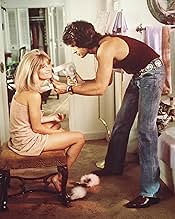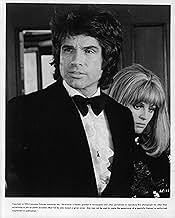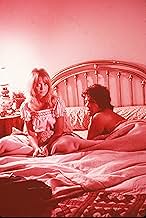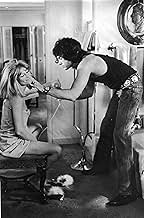IMDb-BEWERTUNG
6,4/10
15.222
IHRE BEWERTUNG
Am Wahltag 1968 ist ein Friseur und Damenmann zu sehr damit beschäftigt, Haare zu schneiden und sich mit seinen verschiedenen Freundinnen und seiner Geliebten zu beschäftigen.Am Wahltag 1968 ist ein Friseur und Damenmann zu sehr damit beschäftigt, Haare zu schneiden und sich mit seinen verschiedenen Freundinnen und seiner Geliebten zu beschäftigen.Am Wahltag 1968 ist ein Friseur und Damenmann zu sehr damit beschäftigt, Haare zu schneiden und sich mit seinen verschiedenen Freundinnen und seiner Geliebten zu beschäftigen.
- 1 Oscar gewonnen
- 3 Gewinne & 11 Nominierungen insgesamt
Empfohlene Bewertungen
In a recent interview in Cineaste magazine, celeb film critic Pauline Kael described the 1970's as the greatest decade of American movies. She then laid claim by listing her seven favorite films from that period. One of the films mentioned was Shampoo. I couldn't agree more with Pauline. Aside from the lighting and some of the camerawork, everything in the film is about as good as it gets---Robert Towne's ear for common parlance, Beatty's understated charisma, and Ashby's whirlwind direction.
It's strange that more people haven't written about this movie. In many ways, Shampoo seems to have been forgotten, floating somewhere in film history heaven. I live in Los Angeles and have never heard about it being screened anywhere. Dave Kehr and the critical establishment in general have all written it off as a film that hasn't aged well. And I've never seen a book written about either Shampoo or Ashby. Am I living in a vault or is this really the legacy of Shampoo? If you don't like this movie, I urge you to write or contact me. My e-mail address is listed above. I simply don't understand why more people don't
It's strange that more people haven't written about this movie. In many ways, Shampoo seems to have been forgotten, floating somewhere in film history heaven. I live in Los Angeles and have never heard about it being screened anywhere. Dave Kehr and the critical establishment in general have all written it off as a film that hasn't aged well. And I've never seen a book written about either Shampoo or Ashby. Am I living in a vault or is this really the legacy of Shampoo? If you don't like this movie, I urge you to write or contact me. My e-mail address is listed above. I simply don't understand why more people don't
Beatty says he approached Towne to do a modern version of the classic restoration comedy called The Country Wife (hilarious by the way). In the original play, the hero beds all the wives by confessing to their husbands that he's impotent so the husbands make fun of him and think nothing of leaving their frustrated and underappreciated wives in his care.
Here in the updated "Shampoo", Beatty and Towne make the hero an assumed-to-be-gay hairdresser (instead of impotent)and the results are inspired bedroom farce mixed with social satire.
Younger viewers may find the film a little dated but it was a "period" film when it was made (set in 68 when it was shot in 74) so Ashby consciously gave it that dated look. For me this and Heaven Can Wait are Beatty's best work. Walks a fine comic/tragic line. And this really feels like the closest character to Beatty's heart. It was after this that I went back and saw Splendor in the Grass and began to appreciate Beatty as an actor rather than just a gigolo celebrity.
Great dialogue by Towne, Jack Warden's hilarious and Julie Christie is stunning.
Here in the updated "Shampoo", Beatty and Towne make the hero an assumed-to-be-gay hairdresser (instead of impotent)and the results are inspired bedroom farce mixed with social satire.
Younger viewers may find the film a little dated but it was a "period" film when it was made (set in 68 when it was shot in 74) so Ashby consciously gave it that dated look. For me this and Heaven Can Wait are Beatty's best work. Walks a fine comic/tragic line. And this really feels like the closest character to Beatty's heart. It was after this that I went back and saw Splendor in the Grass and began to appreciate Beatty as an actor rather than just a gigolo celebrity.
Great dialogue by Towne, Jack Warden's hilarious and Julie Christie is stunning.
Robert Towne's "Chinatown" is considered the greatest script of the past 30 years, but I think "Shampoo" (written by Towne and Beatty) is even better. It is an intricately constructed sex farce, with realistic, flesh-and-blood characters. Beatty's character, George, is trying to serve two masters -- his own uncontrollable libido, and his desire to set up his own hair salon. These two desires come into direct conflict when he seeks funding from wealthy financier Lester (Jack Warden), while also having affairs with Lester's wife Felicia (Lee Grant), Lester's mistress Jackie(Julie Christie), and even Lester's daugther (Carrie Fisher). In fact, George beds all of these women in a 24-hour period, while also trying to maintain his relationship with his steady girlfriend (Goldie Hawn). All of these incompatible desires are compressed into a short time frame, and George's life unravels spectacularly, as he learns some very hard lessons by the end.
Structurally, "Shampoo" is brilliantly devised. Each character has an opposite. George, the satyr, has Lester, the cuckhold, as his opposite. George exudes natural sexual appeal, whereas Lester is loved merely for his wealth. Tony Bill's character, an ad executive, is the younger version of Lester. Tony Bill dangles a job offer to Goldie Hawn in order to bed her. Despite his hip outward appearance, this character is as staid as Lester. In fact, the two characters are linked by separate scenes in which each one stares out of a skyscraper window, gazing at a panoramic view of L.A., and makes a world-weary comment about the craziness below (in Bill's case, he says, "Jesus, this town"). There is also a contrast between George and Jackie. George, in his own words, "doesn't f*** for money, I do it for fun," whereas Jackie ends up as a kept girl (by Lester). Goldie Hawn's character also prostitutes herself, in a very subtle way. In the moral universe of Beverly Hills in 1968, Beatty's promiscuity seems more pure than the money-driven machinations of everyone else.
Structurally, "Shampoo" is brilliantly devised. Each character has an opposite. George, the satyr, has Lester, the cuckhold, as his opposite. George exudes natural sexual appeal, whereas Lester is loved merely for his wealth. Tony Bill's character, an ad executive, is the younger version of Lester. Tony Bill dangles a job offer to Goldie Hawn in order to bed her. Despite his hip outward appearance, this character is as staid as Lester. In fact, the two characters are linked by separate scenes in which each one stares out of a skyscraper window, gazing at a panoramic view of L.A., and makes a world-weary comment about the craziness below (in Bill's case, he says, "Jesus, this town"). There is also a contrast between George and Jackie. George, in his own words, "doesn't f*** for money, I do it for fun," whereas Jackie ends up as a kept girl (by Lester). Goldie Hawn's character also prostitutes herself, in a very subtle way. In the moral universe of Beverly Hills in 1968, Beatty's promiscuity seems more pure than the money-driven machinations of everyone else.
A day in the life of a Southern California hairstylist (Beatty) as he beds three women (Christie, Hawn and Lee Grant) while at the same time trying to seek a loan from businessman Lester (Oscar nominee Jack Warden) to help him open his own salon
His world soon starts to fall apart as he realizes what he fervently wishes in life and the limitations of his cheerful posture toward others
Lee Grant won an Oscar for playing Lester's bored wife who can't seem to take her eyes off Beatty, and even her nymphet daughter (a young Carrie Fisher) desperately wanted him to be engaging in reciprocal sex Grant's actually quite jovial and adorable in her role as we heartily feel for her character near the climax
Warren Beatty appears either excitable or distracted through most of the story He lies, hides, and denies facts, doing whatever it takes to make everyone happy...
If you like to see Julie Christie notoriously fellating Beatty underneath an elegant dinner table well don't miss this funny sex comedy which received four Oscar nominations
Lee Grant won an Oscar for playing Lester's bored wife who can't seem to take her eyes off Beatty, and even her nymphet daughter (a young Carrie Fisher) desperately wanted him to be engaging in reciprocal sex Grant's actually quite jovial and adorable in her role as we heartily feel for her character near the climax
Warren Beatty appears either excitable or distracted through most of the story He lies, hides, and denies facts, doing whatever it takes to make everyone happy...
If you like to see Julie Christie notoriously fellating Beatty underneath an elegant dinner table well don't miss this funny sex comedy which received four Oscar nominations
'Shampoo' is quite an interesting period black comedy set in the late 60s during the sex revolution. In one sentence, it's about a Casanova hairdresser who sleeps around with every woman he meets but there is one whom he loves and she happens to be the mistress of a not-to-mess-with businessman. Ashby does a splendid job in bringing out the 60's look but it is Towne and Beatty who bring the feel especially through the dialogues and use of language. Not to mention, the make-up department that does an equally fine job. The humour is somewhat different from other films and traditional viewers may find the jokes somewhat vulgar but that doesn't bother me as long as they manage to draw chuckles and at least make me smile. The actors, that include a vivacious supercute Goldie Hawn, a sizzling Julie Christie, a hilarious Jack Warden, a fiery Lee Grant and a very young Carrie Fisher. But, it is Warren Beaty's film. He demonstrates George's wildness, passion, vulnerability and despair with effective skill. In my humble opinion it is one of his best works, both as actor and writer. I don't understand why people call it outdated. It is set in an older time and if the humour still works, why is it obsolete? I got the movie randomly and now I'm glad that I picked this one.
Wusstest du schon
- WissenswertesLovers off and on since 1967, Warren Beatty and Julie Christie broke up for good during the making of this movie. They remained friends and later worked together in Der Himmel soll warten (1978).
- PatzerThe Coca-Cola can George drinks from while chatting with Lorna is a post-1968 design.
- Zitate
George Roundy: Can't we just, eh, be friends?
Lorna: Okay.
[teen-aged Lorna makes George an offer he can't refuse]
Lorna: You wanna fuck?
- Crazy CreditsIn the opening credits, horror film producer/actor William Castle is billed as "Bill Castle," but in the end credits he is back to "William Castle."
- VerbindungenFeatured in Precious Images (1986)
- SoundtracksWouldn't It Be Nice
(1966) (uncredited)
Music by Brian Wilson
Lyrics by Tony Asher, Mike Love and Brian Wilson
Performed by The Beach Boys
Top-Auswahl
Melde dich zum Bewerten an und greife auf die Watchlist für personalisierte Empfehlungen zu.
- How long is Shampoo?Powered by Alexa
Details
- Erscheinungsdatum
- Herkunftsland
- Sprache
- Auch bekannt als
- Sosyete kuaförü
- Drehorte
- 2270 Bowmont Drive, Beverly Hills, Kalifornien, USA(Jackie's House at Bowmont & Hazen)
- Produktionsfirmen
- Weitere beteiligte Unternehmen bei IMDbPro anzeigen
Box Office
- Budget
- 4.000.000 $ (geschätzt)
- Bruttoertrag in den USA und Kanada
- 49.407.734 $
- Weltweiter Bruttoertrag
- 49.407.734 $
Zu dieser Seite beitragen
Bearbeitung vorschlagen oder fehlenden Inhalt hinzufügen






















